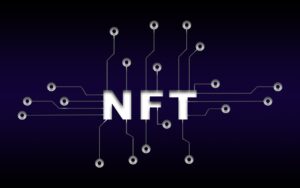Uncensored Crypto docuseries episode 4 takes a look at NFTs, the different use cases for tokenization besides just collectibles, the future of the metaverse, and the impact AI could have on the crypto world.
The docuseries as a whole discusses how censorship is being used to hide the benefits of cryptocurrency, DeFi, and decentralized systems from people looking for financial freedom. It also covers how crypto has the potential to completely change the traditional centralized systems as we currently know them.
This episode continues exploring some of the series’ overarching themes: censorship, the power struggle between the crypto world and traditional institutions, and how the use cases for blockchain technologies are only likely to grow over time.
Recap of topics covered in Uncensored Crypto docuseries episode 4
NFTs
 “So when I think about the future of NFTs and how the market is likely to evolve, I really think about how some of the earliest digital collectibles and digital art are really the on-ramps showing people what’s possible with NFTs. But in the next couple of years, I expect that all of the things we interact with online: internet domains, other things that are unique and specific that we have ownership over, even things that don’t necessarily represent value, [like] our college degrees […] might be represented through NFTs that are given out to the investors.” – David Namdar
“So when I think about the future of NFTs and how the market is likely to evolve, I really think about how some of the earliest digital collectibles and digital art are really the on-ramps showing people what’s possible with NFTs. But in the next couple of years, I expect that all of the things we interact with online: internet domains, other things that are unique and specific that we have ownership over, even things that don’t necessarily represent value, [like] our college degrees […] might be represented through NFTs that are given out to the investors.” – David Namdar
The potential use cases for NFTs are debated throughout Uncensored Crypto docuseries episode 4. Are they just for digital art and collectibles? Or will they ever expand into other applications? While some in the cryptocurrency world seem to think NFTs are overvalued and will only ever have a place in the art world, others see the NFT market quickly growing in the near future.
This is because the idea behind NFTs–that a bit of information claiming ownership over a digital or non-digital item can be stored on a blockchain–can be applied to a variety of scenarios.
While NFTs have already made major headway in the music, gaming, digital art, sports memorabilia, and collectibles industries, other use cases could see growth as the space continues to develop.
This includes real estate, equity in a company, domain names, supply chain and logistics documentation, and even as a replacement for physical copies of IDs like driver’s licenses and passports.
Tokenization
“You can tokenize ancient sites, and you can actually allow people to invest in the preservation of ancient sites. So, there’s so many ways that I think we’re going to start seeing it particularly with NFTs. So I think we’re going to start seeing people using NFTs for many, many more purposes than the ones that we’ve heard about the most, which is getting money to artists and so forth. So, I just think the future is so rich and exciting.” – Dr. Jane Thomason
The key concept behind NFTs is tokenization. Tokenization is when a digital or non-digital asset is converted into a digital unit called a “token,” which is easier to trade, sell, or purchase. The token is a representation of the actual item’s value.
As mentioned above, exciting use cases for NFTs and tokenization include supporting industries like real estate and supply chain logistics.
However, a creative application discussed in Uncensored Crypto docuseries episode 4 is using tokenization to help protect the environment.
Dr. Jane Thomason brings up the possibility of tokenizing ancient sites such as the Amazon rainforest. This would incentivize the forest’s owners to preserve the site, because they would earn more value from the NFTs than they would by cutting down the trees.
Another example of this in the fourth episode of the docuseries is when crypto expert Susan Oh talks about an NFT campaign to raise money to save Bali elephants that are suffering due to lack of income from the tourism industry caused by the pandemic lockdowns. The campaign was able to tokenize footage of these elephants, which could be purchased as an NFT.
These two examples show that NFTs and tokenization could have a social impact as well. This shows that NFTs are more than just items, but that they can be used to create communities of people interested in a topic, build awareness around a social issue, and raise funds for important causes.
AI
 I think artificial intelligence can be very good for humanity in the sense that it saves a lot of […] repetitive work and helps us to do things in a more efficient way. However, right now, all the AI progress is made by these large tech companies like Google, Facebook, Microsoft, Alibaba […] That’s why I think, on a high level, blockchain, crypto, or Web 3.0 can help mitigate the negative effect of that by decentralizing the storage of the data, so these platforms have less leverage against individuals or small organizations. -Jerry Tang
I think artificial intelligence can be very good for humanity in the sense that it saves a lot of […] repetitive work and helps us to do things in a more efficient way. However, right now, all the AI progress is made by these large tech companies like Google, Facebook, Microsoft, Alibaba […] That’s why I think, on a high level, blockchain, crypto, or Web 3.0 can help mitigate the negative effect of that by decentralizing the storage of the data, so these platforms have less leverage against individuals or small organizations. -Jerry Tang
Uncensored Crypto docuseries episode 4 takes a look at the role of artificial intelligence and the impact it could have on decentralization. AI is already playing an important role in the blockchain industry and the creation of the metaverse.
As blockchains handle more data, AI will be the tool used to help analyze and make decisions based on it. Some companies, such as Microsoft, are finding ways to host machine learning models on blockchains, which would help make AI decentralized and more accessible to anyone using the system.
This episode of the docuseries explores the harms of AI being concentrated in the hands of powerful centralized corporations. Crypto expert Jerry Tang makes the case that one way to protect individuals and smaller businesses from this power is to shift towards a decentralized web 3.0, where cryptography is used to secure data.
Metaverse
So Metaverse as a word means different things to different people. I think there’s no single definition of what this is. At the end of the day, I really believe it’s about bringing together social networking capabilities into the blockchain. It’s a new way for people to interact, a new way for people to express themselves, a new way for people to collect art, all of the things that have happened in traditional Web 2.0 around interaction with people can now happen in this whole new world with different pieces and components to interact with. -Jesse Proudman
“Metaverse” has been a popular buzzword in the cryptocurrency and tech world as a whole, especially since Facebook announced it was changing its name to Meta. And with big names like Amazon, Microsoft, and Facebook all working on building the metaverse, many people are wondering what exactly it is.
Uncensored crypto docuseries episode 4 takes a look at this question, exploring how the metaverse will be a more immersive, 3D experience of the web that we currently use. The metaverse is essentially a new place for people to socialize, shop, create, and learn.
However, it can also integrate smart contracts, cryptocurrency, NFTs, and even allow people to buy digital real estate and other assets, making it possible to actually earn real money.
The docuseries also makes the point that the rise of the metaverse provides opportunities for people to own assets they otherwise couldn’t afford to buy in the real world. As the metaverse develops, blockchain technology will play an important role in helping to keep everyone’s data secure and private.
What does the future look like for NFTs and the Metaverse?
Future of NFTs
The popularity of NFTs exploded in 2021. In the third quarter of the year, NFTs reached a sales volume of $10.7 billion, which marked a 704% increase from the second quarter.
Earlier in the year, an NFT titled “Everyday: The First 5,000 Days” by digital artist Beeple sold for $69 million, the most expensive NFT ever sold at auction.
Considering that many celebrities are releasing their own NFTs and that multiple blockchain projects have launched their own NFT marketplaces, it’s safe to say the trend isn’t going anywhere in the future.
Some of the biggest NFT projects going on now are in the gaming industry. For example, Decentraland is a virtual reality platform where digital real estate can be bought as NFTs. While this sounds like a simple game, the platform has seen some huge investments.
As mentioned in Uncensored Crypto docuseries episode 4, there are many use cases for NFTs outside of just digital art and collectibles, and they could even have the potential to make a positive social impact.
As tokenization continues to grow, the future of NFTs could lie in industries like gaming, real estate, logistics, and DeFi.
Future of the metaverse
 The metaverse is still just in its earliest stages of development, but metaverse entrepreneurs, creators, companies, and tech giants already have high hopes for its future.
The metaverse is still just in its earliest stages of development, but metaverse entrepreneurs, creators, companies, and tech giants already have high hopes for its future.
When Facebook officially changed its company name to “Meta” in October of 2021, it demonstrated its commitment to building this virtual reality space. Mark Zuckerberg even stated that he thinks “the metaverse will be the successor to the mobile internet.”
With such high expectations, many other companies across an array of industries have jumped on the bandwagon. This includes gaming companies like Roblox and Epic Games, fashion brands like Gucci and Dolce & Gabbana, automobile companies like Nissan and BMW, and popular consumer brands like Disney, Nike, and Coca-Cola.
Many think that the metaverse will replace the current internet and social media landscape as we know it, and eventually become a more immersive, interactive, and 3D digital space, which is likely why many companies have invested so much money to claim their place in the virtual reality landscape.
The metaverse is closely tied to NFTs and crypto, as these are what allow it to create actual assets with real-world value. As cryptocurrency and blockchain industries continue to become more popular, the future of the metaverse will grow along with them.
About the Author

Michael Hearne
About Decentral Publishing
Decentral Publishing is dedicated to producing content through our blog, eBooks, and docu-series to help our readers deepen their knowledge of cryptocurrency and related topics. Do you have a fresh perspective or any other topics worth discussing? Keep the conversation going with us online at: Facebook, Twitter, Instagram, and LinkedIn.


